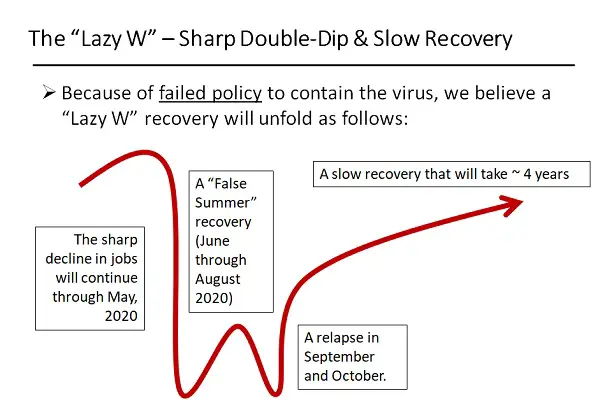Real estate investor Marcel Arsenault has racked up Warren Buffett-scale profits over the past few credit cycles by loading up on “empty buildings” at the bottom, filling them with paying tenants, and then selling at the top. In a recent message to investors, he warns that the current market is especially tricky. Here’s an excerpt:
Our Rationale for a Highly Dangerous “Lazy W”
• The U.S. is already experiencing extremely sharp job losses.
• We project 26.9 million jobs lost between March and May, 2020.
• This implies an unemployment rate of 21.4% by May, 2020 – the highest since the 1930s.
• Because of the immense economic damage, RCS believes there will be intense political and economic pressure to reopen the economy (while unprepared);
• Businesses rehire, hoping to rebuild lost sales.
• RCS estimates nearly 10.0 million jobs will be regained, lowering the unemployment rate to 15.1% by August, 2020.
• This premature “relapse” also happened in the 1918 Flu Pandemic.
• Re-opening of the economy without the right programs in place causes a “second wave” of new Covid-19 cases in the Fall.
• States reimplement Shelter-in-Place orders.
• The weakened economy refreezes.
• Weakened businesses capitulate and close permanently.
• By October, 6.9 million jobs will be lost from the premature opening.
Many of these job losses will become persistent.
Conclusions and Implications of Our “Lazy W”
• The Covid-19 Pandemic is setting the economy back several years.
• By YE 2021, considerable demand for nearly every sector of the economy will have been permanently destroyed.
• Employment levels by YE 2021 will be roughly the same as YE 2015.
• It will take until mid-2024 for jobs to recover lost ground.
• Interest rates will stay at historic lows into 2024.
• With high unemployment, the Fed will have no incentive to raise rates.
• Near-term, unemployment peaks at over 20%.
• By YE 2024, the unemployment rate will still be at 6.4%.
• Asset values that were at peak will decline precipitously.
• Equities and commercial real estate will not hit bottom until late 2021.
• Home values will hold up comparatively well.Real Capital Solutions (RCS) believes it is crucial for market participants to keep an open mind to all scenarios and plan defensively.
This scenario is as reasonable as it is scary, especially for the retail investors who have, for some reason, been pouring into stocks lately. Consider:
Young investors pile into stocks, seeing ‘generational-buying moment’ instead of riskThe coronavirus market downturn spurred young people — in some cases, for the first time in their lives — to get started with investing.
A spike in new accounts at online brokers show that young and inexperienced investors saw the coronavirus downturn as an entry point into the world of investing and not a time to hunker down.
“New investors who sense a generational-buying moment but do not have much background in the equity space,” Citi chief U.S. equity strategist Tobias Levkovich said in a note to clients. “We have heard anecdotally about younger individuals with less market experience viewing the March plunge as a unique time to start portfolios and often crowding into the tech arena, purchasing the stocks whose services or products they know and use.”
The major online brokers — Charles Schwab, TD Ameritrade, Etrade and Robinhood — saw new accounts grow as much as 170% in the first quarter, when stocks experienced the fastest bear market and the worst first quarter in history.
But young people apparently saw it as an opportunity and began buying familiar technology stocks.


